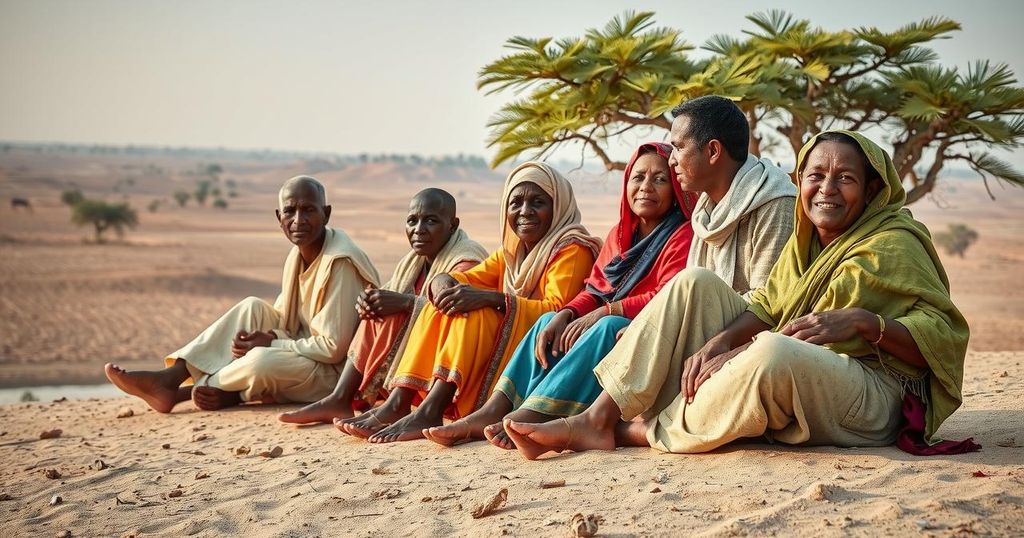Sahel Junta’s Response to Climate Change amid Political Isolation

The Sahel region faces severe climate challenges aggravated by political instability due to military coups in Burkina Faso, Mali, and Niger. Torrential rains have caused widespread flooding, displacing millions and submerging cropland. Political isolation from the West limits access to climate finance, and local adaptation strategies are hampered by weak governance. While more stable countries like Chad leverage coherent climate policies, junta-led nations struggle with isolation. Community involvement and regional cooperation are crucial for effective climate adaptation in the Sahel.
The Sahel region continues to face severe challenges due to climate change, exacerbated by political turmoil stemming from recent military coups in countries such as Burkina Faso, Mali, and Niger. Torrential rains during the rainy season, which stretches from July to September, have resulted in widespread flooding, displacing millions and inundating vast expanses of agricultural land. This situation has been worsened by decreased access to international climate finance, leaving local communities to confront the adverse effects of climate change with limited resources.
Efforts to empower local communities, such as initiatives led by the Sahara and Sahel Observatory (OSS), focus on sustainable management of land and water resources, utilizing local knowledge for resilience. However, political instability and governance issues significantly hinder these initiatives. The Sahel’s semiarid climate predisposes it to drought, desertification, and increasing water scarcity, making adaptation efforts critical yet difficult under current political conditions.
Countries like Chad and Mauritania have fared relatively better with more cohesive climate policies, thanks to comparatively stable governments. However, junta-led nations struggle due to political isolation and sanctions from the West, which limit financial support for climate adaptation projects. As international donors remain cautious, local adaptation strategies emphasizing agroecology and community involvement have gained more importance in the Sahel.
The OSS plays a vital role in helping these countries navigate climate finance mechanisms, but obstacles remain, including limited institutional capacity to implement extensive adaptation projects. While some governments look to non-Western partnerships for support, these collaborations often miss the direct focus on climate adaptation. The multitude of challenges highlights the urgent need for enhanced governance and regional cooperation to confront the intersection of climate vulnerability and political instability in the Sahel. Seeking to establish robust frameworks that facilitate sustainable resource management will be essential in addressing these intertwined crises effectively.
Through holistic approaches that integrate innovative solutions across borders, the Sahel can work towards a more resilient future. The pressing demands of climate change necessitate collaborative efforts, as emphasized by experts noting, “Climate change does not just affect you, it affects your neighbors.”
In conclusion, while the Sahel grapples with climate change impacts exacerbated by political instability, community-based adaptation and improved governance frameworks emerge as critical components for resilience. Regional cooperation must transcend national borders to address shared vulnerabilities effectively and sustainably, ensuring that the most affected populations are equipped to adapt to the ongoing climate crisis.
The Sahel, a semi-arid region located just below the Sahara Desert, is particularly vulnerable to climate change due to its reliance on agriculture and the harsh environmental conditions it faces. The region’s geopolitical landscape has been complicated by military coups in recent years, particularly in Burkina Faso, Mali, and Niger, leading to political isolation from Western nations. This isolation has hindered access to essential climate finance, leaving communities struggling amidst extreme weather events, including floods and prolonged droughts. Organizations like the Sahara and Sahel Observatory strive to empower local communities through sustainable land and water management initiatives, yet political instability continues to impede effective implementation of climate adaptation strategies.
The intersection of climate vulnerability and political instability in the Sahel compels urgent action and collective responses tailored to local needs. With military governments often prioritizing security over environmental concerns, crafting coherent climate policies remains crucial. Through regional cooperation, enhanced governance, and the empowerment of local communities, the Sahel can strive toward effective climate resilience amidst political challenges. By utilizing innovative solutions that transcend national borders, the region can better address the pressing impacts of climate change.
Original Source: news.mongabay.com






